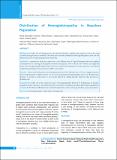Please use this identifier to cite or link to this item:
https://hdl.handle.net/20.500.14356/1196Full metadata record
| DC Field | Value | Language |
|---|---|---|
| dc.contributor.author | Shrestha, Rekha Manandhar | - |
| dc.contributor.author | Pandit, Roshana | - |
| dc.contributor.author | Yadav, Udaya Kumar | - |
| dc.contributor.author | Das, Rameshwar | - |
| dc.contributor.author | Yadav, Binod Kumar | - |
| dc.contributor.author | Upreti, Harish Chandra | - |
| dc.date.accessioned | 2023-05-02T09:20:12Z | - |
| dc.date.available | 2023-05-02T09:20:12Z | - |
| dc.date.issued | 2020 | - |
| dc.identifier.citation | ShresthaR. M., PanditR., YadavU. K., DasR., YadavB. K., & UpretiH. C. (2020). Distribution of Hemoglobinopathy in Nepalese Population. Journal of Nepal Health Research Council, 18(1), 52-58. https://doi.org/10.33314/jnhrc.v18i1.2303 | en_US |
| dc.identifier.issn | JNHRC Print ISSN: 1727-5482; Online ISSN: 1999-6217 | - |
| dc.identifier.uri | http://103.69.126.140:8080/handle/20.500.14356/1196 | - |
| dc.description | Original Article | en_US |
| dc.description.abstract | Abstract Background: Sickle cell and thalassemia are the inherited disorders of globin chain synthesis, and are the most common monogenic disease worldwide. This study aims to find the distribution of hemoglobinopathies (sickle cell and thalassemia) cases in Nepal using laboratory based data. Methods: A retrospective study was carried out at five different sites of Nepal Government that uses capillary electrophoresis for screening of hemoglobin disorders from January 2019 to March 2019. All the cases diagnosed positive for hemoglobinopathy till December 2018 were collected from laboratory record at each sites, and analyzed using Statistical Package for Social Sciences (SPSS version 20.0). Results: Out of total 4018 patients tested during the period in all five different sites, 1470 were diagnosed positive for hemoglobinopathy. Sickling disorder was the most predominant hemoglobinopathy followed by ?-thalassemia. Province 5, province 6 and province 7 were mostly affected by sickling disorder while the other provinces by ?-thalassemia. Conclusions: Sickle cell is the commonest cause of hemoglobinopathy followed by B thallesmias in Nepalese population. Sickle cell is more concentrated towards western part of Nepal and especially in Tharu ethnic population. In contrast, the distribution of ?-thalassemia is found throughout the country and among all ethnic groups of population. Keywords: Hemoglobinopathy; Nepal; sickle cell; thalassemia | en_US |
| dc.language.iso | en | en_US |
| dc.publisher | Nepal Health Research Council | en_US |
| dc.relation.ispartofseries | Jan-Mar 2020;2303 | - |
| dc.subject | Hemoglobinopathy | en_US |
| dc.subject | Nepal | en_US |
| dc.subject | Sickle cell | en_US |
| dc.subject | Thalassemia | en_US |
| dc.title | Distribution of Hemoglobinopathy in Nepalese Population | en_US |
| dc.type | Journal Article | en_US |
| local.journal.category | Original Article | - |
| Appears in Collections: | Vol. 18 No. 1 (2020): Vol. 18 No. 1 Issue 46 Jan-Mar 2020 | |
Files in This Item:
| File | Description | Size | Format | |
|---|---|---|---|---|
| 2303-Manuscript-14306-1-10-20200420.pdf | Fulltext Artocle. | 547.69 kB | Adobe PDF |  View/Open |
Items in DSpace are protected by copyright, with all rights reserved, unless otherwise indicated.
